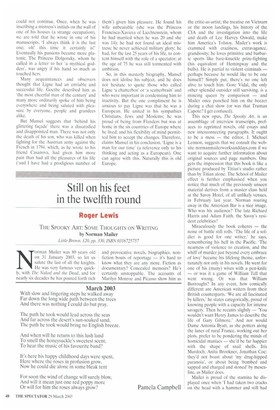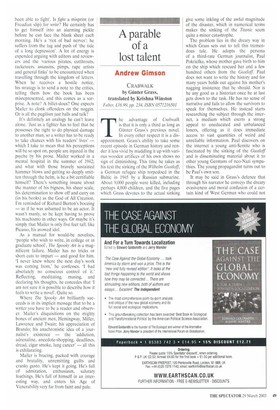Still on his feet in the twelfth round
Roger Lewis
THE SPOOKY ART: SOME THOUGHTS ON WRITING by Norman Mailer Little Brown, £20, pp. 330, ISBN 0316725757
Norman Mailer was 80 years old on 31 January 2003, so let us salute the last of all the knights. He was very famous very quickly, with The Naked and the Dead, and for nearly six decades he has poured forth rich
and provocative novels, biographies, nonfiction bouts of reportage — it's hard to I know what they are any more. Fiction as documentary? Concealed memoirs? He's certainly unstoppable. The accounts of Marilyn Monroe and Picasso show him as the critic-as-artist; the treatise on Vietnam or the moon landings, his history of the CIA and the investigation into the life and death of Lee Harvey Oswald, make him America's Tolstoy. Mailer's work is crammed with craziness, extravagance, grandiosity; he loves primitive and barbaric sports like bare-knuckle prize-fighting (his equivalent of Hemingway and the bulls). He is partial to violent criminals — perhaps because he would like to be one himself? Simply put, there's no one left alive to touch him. Gore Vidal, the only other splendid outsider still surviving, is a mincing queen by comparison — and Mailer once punched him on the beezer during a chat show (or was that Truman Capote? I get confused).
This new opus, The Spooky Art, is an assemblage of interview transcripts, prefaces to reprinted novels, old essays and new interconnecting paragraphs. It ought to be a mess — the editor, J. Michael Lennon, suggests that we consult the website normanmailerworksanddays.com if we want to acquire further information about original sources and page numbers. One gets the impression that this book is like a picture produced by Titian's studio rather than by Titian alone. The School of Mailer effect is further emphasised when you notice that much of the previously unseen material derives from a master class held at the Savoy Hotel, of all unlikely venues, in February last year. Norman roaring away in the American Bar is a nice image. Who was his audience? The late Richard Harris and Adam Faith, the Savoy's resident celebrities?
Miraculously the book coheres — the noise of battle still rolls. The life of a soldier is good for one writer,' he says, remembering his hell in the Pacific. 'The nearness of violence to creation, and the whiff of murder just beyond every embrace of love' became his lifelong theme, unfortunately not only in his novels. He went for one of his (many) wives with a pen-knife — or was it a game of William Tell that went wrong. Or was that William Burroughs? In any event, how comically different are American writers from their British counterparts. 'We are all fascinated by killers,' he states categorically, proud of knowing people with a capacity for intense savagery. Then he recants slightly — 'You wouldn't want Henry James to describe the life of Gary Gilmore.' And nor would Dame Antonia Byatt, as she potters along the lanes of rural France, working out her plots, prefer to be pondering the minds of homicidal maniacs — she'd be far happier with the shape of snail shells. Iris Murdoch, Anita Brookner, Jonathan Coe: they'd not boast about 'my drug-hipped paranoia', or about being 'bombed and sapped and charged and stoned' by mescaline, as Mailer does.
Mailer is proud of the stamina he displayed once when 'I had taken two cracks on the head with a hammer and still had been able to fight'. Is fight a misprint (or Freudian slip) for write? He certainly has to get himself into an alarming pickle before he can face the blank sheet each morning. He's a 'riot of had nerves': he suffers from the tug and push of 'the tide of a long depression'. A lot of energy is expended arguing with editors and reviewers and the 'various pirates, cutthroats, racketeers, assassins, pimps, rape artists and general finks' to be encountered when travelling through the kingdom of letters. When he receives a hostile notice, his strategy is to send a note to the critics, telling them how the book has been misrepresented, and this comes as a surprise. A note? A billet-doux? One expects Mailer to clonk offenders on the noggin. Or is all the pugilism just balls and talk?
It's definitely an analogy he can't leave alone. 'Just as a fighter has to feel that he possesses the right to do physical damage to another man, so a writer has to be ready to take chances with his readers' lives' — which I take to mean that his perceptions will be so spot on, people are injured in the psyche by his prose. Mailer worked in a mental hospital in the summer of 1942; and what with those bravely sustained hammer blows and getting so deeply smitten through the helm, is he a bit certifiable himself? There's something insane about the manner of his bigness, his sheer scale, his determination to show off and carry on (in his books) as the God of All Creation. I'm reminded of Richard Burton's boozing — as if he was ashamed to be an actor. It wasn't manly, so he kept having to prove his machismo in other ways. Or maybe it's simply that Mailer is only five feet tall, like Picasso, his avowed idol.
As a manual for would-be novelists, 'people who wish to write, in college or in graduate school', The Spooky Art is a magnificent failure. Mailer has no tricks or short cuts to impart — and good for him. 'I never knew where the next day's work was coming from,' he confesses. 'I had absolutely no conscious control of it.' Reflecting, meditating, musing, and declaring his thoughts, he concedes that 'I am not sure it is possible to describe how it feels to write a novel'. Quite so.
Where The Spooky Art brilliantly succeeds is in its implicit message that to be a writer you have to be a reader and observer. Mailer's disquisitions on the mighty bones of ancient men, Hemingway, Miller, Lawrence and Twain; his appreciation of Brando; his anachronistic idea of a journalist's existence — the 'addiction, adrenaline, anecdote-shopping, deadlines, dread, cigar smoke, lung cancer' — all this is exhilarating.
Mailer is bracing, packed with courage and brutality, unremitting guilts and cranky gusto. He's kept it going. He's full of admiration, enthusiasm, salutary loathings. He's full of himself in an interesting way, and enters his Age of Venerability very far from faint and pale.









































































 Previous page
Previous page